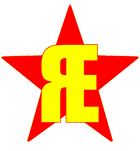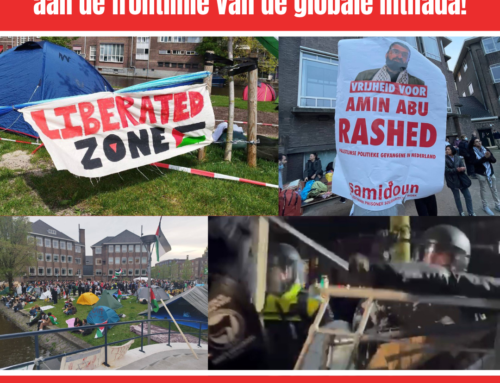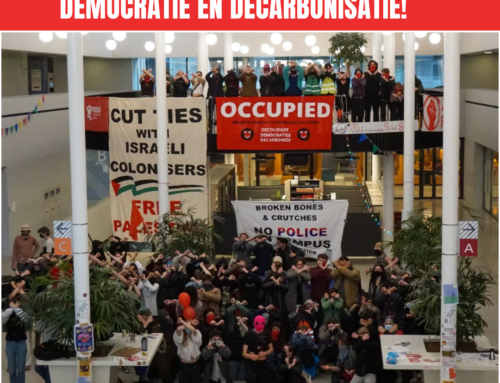PRESS RELEASE
24 September 2017
Senior revolutionaries, young activists raise clenched fists together in conference on the continuing validity of the October Revolution
AMSTERDAM, 24 September—Senior and veteran revolutionaries, socialist advocates and progressive political leaders, many of them with white or thinning hair, raised their clenched fists once more—this time with young social and cultural activists and trade unionists. Young and old together marked the October Revolution of 1917 with a People’s Conference that affirmed its relevance to the continuing struggle for revolutionary change in the 21st century.
The conference, held at a local facility here on September 23-24, is one of the main culminating events of the year-long October Revolution Centennial Commemoration (ORCC) campaign, which began with a launch in Manila, the Philippines in May, and continued with followup events in the U.S., Canada, and other countries in the following months.
The Great October Socialist Revolution was the culmination of a massive social upheaval at the tailend of World War I, in which masses of Russian workers, peasants, and disgruntled soldiers rose to overthrow the provisional Kerensky government on 24-25 October 1917 because of its ruinous policies that continued those of the Tsarist regime, which was itself overthrown earlier in February 1917. The October uprising, with the Bolshevik party led by V.I. Lenin at the core, swept into power the Bolshevik-dominated Soviets (councils) of workers, peasants and soldiers, and proceeded to build the world’s first socialist state.
For many decades, until it turned revisionist, the Soviet Union inspired all workers and oppressed people throughout the world that there was an alternative to moribund, parasitical, and war-mongering capitalism. More socialist states led by Marxist-Leninist parties emerged after World War II, and the theory and practice of proletarian revolution continued to inspire movements for national liberation and democracy among workers, women, youth, minorities, and others worldwide.
The conference’s main message, according to its organizers, is that this watershed event in history has continuing validity in the 21st century and carries valuable lessons for people’s struggles against imperialism and all other forms of oppression and exploitation. The main organizers are the International League of People’s Struggle (ILPS), People’s Resource for International Solidarity and Mobilization (PRISMM), and the National Democratic Front of the Philippines (NDF).
The conference also addressed the recurring question of revisionist reversals that led to capitalist restoration, the role of and lessons from the Great Proletarian Cultural Revolution, and questions of proletarian leadership in the current situation.
The conference, initiated and closely supported by several organizations with some international presence, drew 81 participants representing 27 organizations and 23 countries. These included big organizational delegations and individual participants as well from Nepal, Belgium, Canada, People’s Republic of China, Denmark, Ecuador, France, Germany, Indonesia, Ireland, Italy, Kurdistan, Molucca, Luxembourg, Netherlands, Norway, Peru, The Philippines, Turkey, UK, US, Venezuela and Zambia.
Professor Jose Maria Sison, Founding Chairman of the Communist Party of the Philippines (CPP) and Chair of the International League of People’s Struggle (ILPS), provided the main keynote address of the conference. In his keynote, Prof. Sison emphasized:
“The most resolute and militant revolutionary parties and seminal party groups are those guided by the theory of Marxism-Leninism-Maoism. They are in various industrial capitalist and undeveloped countries. They are the best motivated and best equipped ideologically to carry forward the world proletarian revolution, combat the counterrevolutionary and anti-socialist campaigns of imperialism, revisionism and other counter-revolutionary currents. In this regard, they can avail of the theory of continuing revolution under proletarian dictatorship through cultural revolution in socialist society. They are in various stages of development in arousing, organizing and mobilizing the proletariat and broad masses of the people.”
Many of the speakers and interventions from the floor reflected the conference’s emphasis on exploring how the many lessons of the October Revolution, both positive and negative, could be applied to today’s conditions and be especially understood and appreciated by younger generations of revolutionaries and activists.
Irina Malenko, Soviet-born and -raised author of Sovietica Trilogy, shared how it was to grow up in the former Soviet Union. She lamented the fact that her generation were spoiled as young people growing up in the Soviet state.
“During my generation our parents were so busy building the economy. We did not share too many stories. We were so spoiled that we did not appreciate how we should work for socialism. Ideological work was not given too much value and was neglected,” Malenko stressed.
Stefan Engels, Chairman Emeritus of the Marxist-Leninist Party of Germany (MLPD), who also delivered a keynote speech, said the petty-burgeois mode of thinking has become a mass phenomenon for disorienting, disorganizing and demoralizing the working class and people’s movement. He said one of the focus of the MLPD among others, is “the promotion of the generation change as well as the promotion of workers and women…..to develop a new generation of leading personalities.”
Prof. Fred Engst (Yang Heping), who has lived in the People’s Republic of China during the time of Mao until 1974, directly experienced the Cultural Revolution as a young Red Guard. He recalled that Mao’s leadership and the Cultural Revolution made sure to mobilize the youth and the basic masses in exposing bureaucrats and capitalist roaders and in calling for the abolition of reemerging class privileges.
Per-Gunnar Skotåm of the Red Party (Norway) provided the keynote for the fourth topic, which covered a review of the current international situation, including the state of various proletarian and anti-imperialist movements, the task of rebuilding proletarian revolutionary parties, and prospects for the next wave of revolutionary struggles worldwide.
Youth leaders from the Netherlands, Germany, Palestine, France and Nepal shared their own experiences in youth and student organizing. They assailed pro-imperialist, fascist, and right-wing paradigms peddled by the bourgeois educational system, and the suppression of academic freedom in many schools and campuses.
They lamented the dominance of petty-burgeois thinking, liberal intellectualism and corporate values among contemporary youth and students, but vowed to intensify their education and organizing work among them in order to draw them into the socialist future.
A special guest of the conference, Alvaro Enrique Sanchez Cordero, Chargé d’ Affaires of the Embassy of the Bolivarian Republic of Venezuela in The Hague, called for international solidarity after US President Trump threatened to use military action against the Venezuelan people and their democratically elected government. Conference participants vowed to take solidarity action for Venezuela to counter the US threats, international black propaganda and the economic and political destabilization against the country.
The conference ended with a rousing cultural performance by the young cultural workers of the Netherlands-based Willem Geertman Cultural Collective, and the singing of the “Internationale”, the global anthem of the revolutionary proletariat.
The conference was held at the facilities of the Ru Paré Community, named and operated in honor of a Dutch artist and member of the antifascist resistance during World War II.
Reference:
Boyen Baleva
orcc-europe@ilps.info
Jun Verzola
orcc-oc@prismm.net
October Revolution Centennial Commemoration
Organizing Committee for Europe






